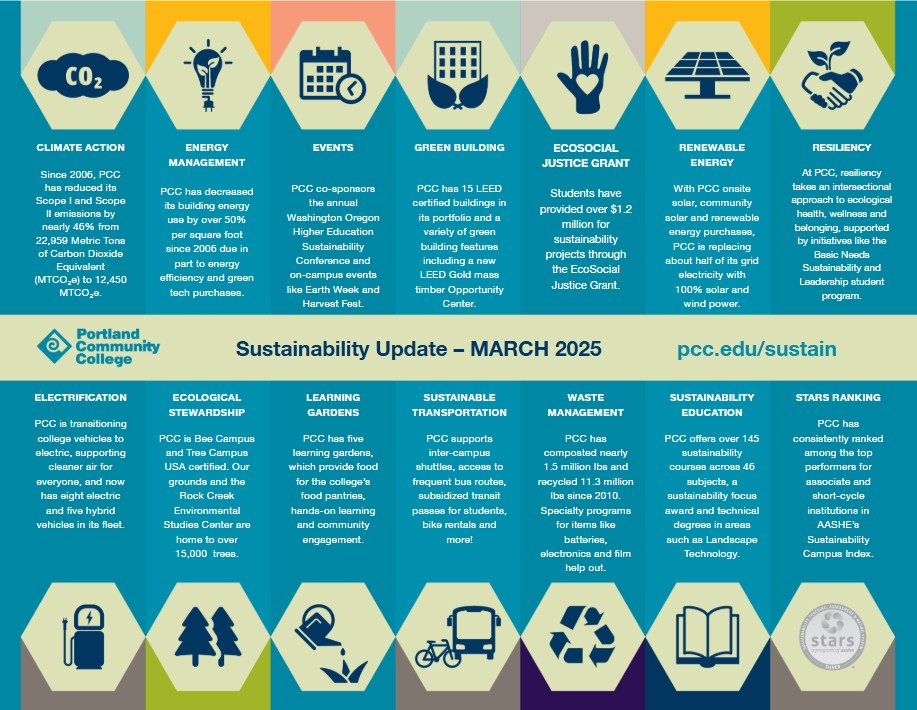Commitment
At the district level, PCC Sustainability is focused on strategizing a foundation for sustainability that will ensure consistent and lasting progress is made in this rapidly evolving field. Among PCC’s institutional commitments is the Second Nature’s Carbon Commitment (formerly known as the American Colleges and University Presidents’ Climate Commitment). The college is also a proud member of the America Is All In coalition.
PCC’s FY 2025 Sustainability Update FY 2024 Sustainability Update (March 2025). All figures are purely decorative.
FY 2024 Sustainability Update (March 2025). All figures are purely decorative.
Climate Action Plan
Portland Community College’s first Climate Action Plan was created in 2009, the second in 2013, and the third in 2021. This comprehensive report outlines how the college intends to reduce its greenhouse gas emissions.
The most recent version, PCC’s 2021 Climate Action Plan: Resiliency, Equity, and Education for a Just Transition is the college’s five-year roadmap toward climate justice. Unified under a shared vision, PCC’s 2021 Climate Action Plan establishes a new carbon neutrality goal of 2040 and outlines clear pathways for equity-focused climate action to be woven throughout operations, academics, student engagement, and future planning.
- Third Edition: 2021 Climate Action Plan
- Second Edition: 2013 Climate Action Plan
- First Edition: 2009 Climate Action Plan
Policies and Reports
STARS
The Sustainability Tracking, Assessment, and Rating System (STARS) is a transparent, self-reporting framework for colleges and universities to measure their sustainability performance. STARS was developed by AASHE, an acknowledged thought leader that advances sustainability by providing invaluable resources, with broad participation from diverse representatives of the higher education community.
In 2025 we received a Gold level rating! PCC received Silver level ratings in 2021, 2017 and 2013.
View PCC’s 2025 STARS complete report on the AASHE website to view past reports.
GHG Emissions
The Portland Community College Sustainability Department completes an annual greenhouse gas (GHG) inventory to monitor our institution’s progress towards meeting our GHG reduction targets as outlined in PCC’s 2021 Climate Action Plan: Resiliency, Equity and Education for a Just Transition. The inventory is a comprehensive look at contribution of college operations to global climate change and covers impacts from such operations as: lighting and heating the college buildings, using college vehicles, purchasing goods and services, business travel and commuting choices. The Greenhouse Gas Emissions Report provides data on PCC’s overall emissions by Inventory year. We’ve been working to achieve a GHG emissions reduction goal of 40% below 2006 emissions by 2030.
View the 2023 GHG Inventory Update to learn more and see our progress to date.
Mission & Board Policy
PCC’s Mission is to support “success by delivering access to quality education while advancing economic development and promoting sustainability in a collaborative culture of diversity, equity, and inclusion.”
Board Policy BP-3551 states that: “Portland Community College is committed to becoming a leader in academic programs and operational practices that model the sustainable use of resources, so that the needs of current generations are met without impairing the ability of future generations to meet their own needs.”
In support of this policy, the PCC Sustainability Leadership Council spearheads the implementation, ongoing monitoring, and updating of the College’s sustainability commitments, including the Climate Action Plan.
Purchasing Policy
PCC’s Board of Directors first approved our sustainability commitment to sustainability purchasing back in 2011.
In 2020 PCC adopted its own Community College Rules of Procurement in accordance with ORS 279.A065(5)(a) and ORS 279A.070. The sustainability commitment section states:
In accordance with the Oregon Community College Rules of Procurement, member colleges are committed to the use and purchase of environmentally and socially responsible materials and products which are fiscally responsible, reduce resource consumption and waste, perform adequately, and promote human health and well-being. Recognizing their regional economic role, colleges shall seek opportunities to educate, encourage, and influence their respective markets by utilizing, where feasible, products and services including new environmentally preferable products, reusable products, recycled content, and recycled products.
We have supplemented our rules with standards and guidelines that support Sustainability in Purchasing.
- PCC’s Design and Construction Standards
- Design and Construction Standards
- PCC Sustainability Guidelines for Purchasing
Sustainability Guidance
The Sustainability Department collaborates with many different areas of the college to create sustainability guidance policies, procedures, and plans including Dining and Events, Facilities, Purchasing Transportation, and Waste and Recycling. This covers everything from stormwater management to surplus property disposal.
Strategic Plan
PCC leads the community in sustainable innovation, efficiency, transparency, and excellence in all of its operations. PCC’s strategic, data-informed approach and open communications streamline management and operations to achieve academic excellence and provide student services in a financially and environmentally sustainable manner.
Learn more about how PCC’s Climate Friendly Fleet & Equipment project supports the PCC Strategic Plan.
Facilities Plan
PCC is recently completed Phase II of the Facilities Plan which expands on the work conducted in Facilities Plan Phase I, completed in 2019. Facilities Planning Phase I was an existing conditions assessment of all college-owned facilities. This second phase will determine the appropriate development patterns and growth capacity of the college as a whole. Phase II incorporated economic and demographic trends, space management, and more. It was integrated with many other college plans such as the recently updated Strategic Plan, Climate Action Plan, and ongoing academic planning. This project has developed a strong strategy to reach out to the different communities the college serves. Additionally, a student cohort trained in Critical Race Theory participated in design workshops and guided the design team in an inclusive design approach.
